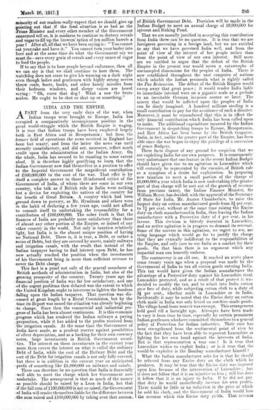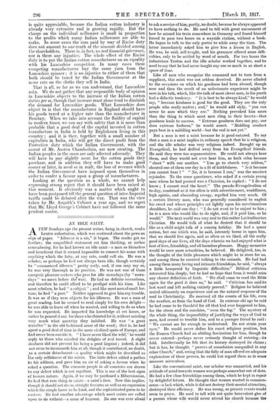INDIA AND THE EMPIRE. A PART from the very early days
of the war, when Indian troops were brought to Europe, India has occupied a comparatively inconspicuous position in the great world-struggle which the British Empire is waging. It is true that Indian troops have been employed largely loth in East Africa and in Mesopotamia' but from the .dormer field of operations the news received in England has been but scanty, and from the latter the news was until .recently unsatisfactory, and did not, moreover, reflect much credit upon the administration of the Indian Army. On the whole, India has seemed to be standing to some extent aloof. It is therefore highly gratifying to learn that the 'Indian Government now find themselves in a position to offer to the Imperial Government the magnificent contribution of £100,000,000 to the cost of the war. That offer is by ;itself a complete answer to those ill-informed critics of the Governnient of India, of whom there are some in our own country, who talk as if British rule in India were nothing but a device for exploiting the natives of the country for the benefit of Great Britain. A country which had been _ground down to poverty, as Mr. Hyndinan and others were m the habit of declaring a few years ago, could not afford to commit itself to undertaking the responsibility for a contribution of 1100,000,000. The sober truth is that the finances of India are probably more satisfactory than those of almost any other portion of the Empire, or indeed of any other country in the world. Not only is taxation relatively light,. but India is in the almost unique position of having no National Debt. There is, it is true, a Debt, or rather a series of Debts, but they are covered by assets, mainly- railways and irrigation canals, with the result that instead of the -Indian taxpayer having to find interest upon Debt, he has now actually reached the position when the investments of his Government bring in more than sufficient revenue to -cover the Debt charge. This fact is a proof not only of the general soundness of British methods of administration in India, but also of the growing prosperity of the country. Twenty years ago the ;financial position of India was fax less satisfactory, and one of the urgent problems then debated was the extent to which the United Kingdom ought to intervene to lighten the burdens ialliug upon the Indian taxpayer. That question was dis- cussed at great length by a Royal Commission, but by the time its Report was issued the situation was already beginning to change. Since then the commercial and industrial pro- .-grees of. India has been almost continuous. It is this economic ;progress which has rendered the Indian railways a paying proposition, while it has added to the profits received from . the irrigation canals. At the same time the Government of India have made, as a prudent reserve against possibilities of silver depreciation, and as a backing for their own currency notes, large investments in British Government securi- ties. The interest on these investments in the current year more than covers the interest on what is called the ordinary Debt of India, while the cost of the Railway Debt and the cost of the Debt for irrigation canals is not only fully covered, but there is in addition in the current year an anticipated • profit of something like £5,000,000 on railways and canals. There can therefore be no question that India is financially -well able to meet the charge which her Government now • -undertake. The arrangement is that as much of the money . as possible should be raised by a Loan in India, but that if the full sum of £100,000,000 is not so raised, the Government of India will render themselves liable for the difference between ,Lhe sum raised and £100,000,000 by taking over that amour. of .British Government Debt. Provision will be made iu the Indian Budget to meet an annual charge of 16,000,000 for interest and Sinking Fund.
That we are morally justified in accepting this contribution ;from India there can- be no question. • It is true that we are foreigners governing in a foreign land, but we are entitled to say that we have governed India well, and from the point of view of the interest of her people rather than from the point of view of our own interest. Still more are we entitled to argue that the defeat of the British Empire in the present war would mean a catastrophe of unexampled. dimensions for the peoples of India. There is now established throughout the vast congeries of nations which inhabit the Indian peninsula what is rightly called the Pax Britannica. The defeat of the British Empire would sweep away that great peace ; it would render India liable to immediate internal wars on a gigantic scale as a prelude to an inevitable German invasion sooner or later. The misery that would be inflicted upon the peoples of India can be dimly imagined. A hundred millions sterling is a small contribution to pay for the avoidance of such a disaster. Moreover, it must be remembered that this is in effect the only financial contribution which India has been called upon to make. The additional expenditure incurred by the Indian Government in despatching troops to Europe, Mesopotamia, and East Africa has been borne by the British taxpayer. India, in fact, unlike the greater part of the Empire, has been able since the war began to enjoy the privilege of a succession of peace Budgets. These facts dispose of any ground for suspicion that we are exploiting India for our own purposes. It is consequently very unfortunate that one feature in the recent Indian Budget should have given rise to an agitation in Lancashire which will certainly be represented by the enemies, of British rule as a symptom of a desire for exploitation. In proposing new taxation to meet a small portion of the charge of £6,000,000 a year which India is now undertaking (the greater part of that charge will be met out of the growth of revenue from previous taxes), the Indian Finance Minister, Sir William Meyer, has decided, with the approval of the Secretary of State for India, Mr. Austen Chamberlain, to raise the Import duty on cotton manufactured goods from 34 per cent. to 71 per cent. without at the same time raising the Excise duty on cloth manufactured in India, thus leaving the Indian manufacturer with a Protective duty of 4 per cent. in his favour. This decision is bitterly resented in Lancashire, and an active -agitation is in progress to demand its reversal. Some of the movers in this agitation, we regret to see, are using language which -would go far to justify the charge that they are cynically indifferent to the responsibilities of the Empire, and only care to use India as a market for their goods. On that basis there is no argument which any impartial man can honestly endorse.
The controversy is an old one. It reached an acute phase some twenty years ago when a proposal was made by the Government of India to tax all cotton goods entering India. This tax would have given the Indian manufacturer the advantage of a Protective duty against his Lancashire rival. Lancashire protested, and as a result of that protest it was decided to modify the tax, and to admit into India cotton yarn free of duty, while subjecting cotton cloth to a duty of 31 per cent., whether made in Lancashire or in India. Incidentally it may be noted that the Excise duty on cotton cloth made in India was only levied on machine-made goods. The village hand-loom weaver was exempt. This arrangement held good till a fortnight ago. Attempts have been made to vary it from time to time, especially by certain prominent Indian gentlemen whohave committed themselves to a general policy of Protection for Indian industries. Their case has been strengthened from the sentimental point of view by the fact that they have been able to represent Lancashire as fighting -for her own hand against the interests of India. But is that representation a true one ? Is it true that Lancashire wishes to exploit India ;. or is it true that the would-be exploiter is the Bombay manufacturer himself ?
What the Indian manufacturer asks for is that he should be relieved from any Excise duty on the cloth which he produces. It may be true that the Excise duty was imposed upon him because of the intervention of Lancashire ; but it does not follow that it is an injustice to him ; still less does it follow that it is an injury to India. If he did not pay that duty he would undoubtedly increase his own profits. There would be little or no reduction in the price at which he sold his cloth, and the Government of India would lose the revenue which this Excise duty yields. That revenue is quite appreciable, because the Indian cotton industry is already very extensive and is growing rapidly. But the charge on the individual millowner is small in proportion to the profits which many Indian millowners are able to make. In some cases the sum paid by way of Excise duty does not amount to one-tenth of the amount divided among the shareholders. There is, in fact, no real financial grievance, nor is there any injustice. The whole effect of the Excise duty is to put the Indian cotton manufacturer on an equality with his Lancashire competitor. In many cases these competing manufacturers buy the same yarn from the Lancashire spinner ; it is no injustice to either of them that both should be taxed by the Indian Government at the same rate on the cloths they sell in India.
That is all, so far as we can understand, that Lancashire asks. We do not gather that any responsible body of opinion in Lancashire objects to the increase of the Indian cotton duties per se, though that increase must alone tend to diminish the demand for Lancashire goods. What Lancashire does object to is that the manufacturer in England should have his goods taxed at a higher rate than the manufacturer in Bombay. When we take into account the fluidity of capital in modern times, we can say with safety that it is more than probable that a good deal of the capital invested in cotton manufacture in India is held by Englishmen living in this country ; and it is they, together with a small number of capitalists in India, who will get the direct profit from the Protective duty which the Indian Government, with the assent of Mr. Austen Chamberlain, arc now creating. The Indian peoples in the mass are only affected adversely. They will have to pay slightly more for the cotton goods they purchase, and in addition they will have to make good sooner or later, in meal or in malt, the loss of revenue which the Indian Government have imposed upon themselves in order to confer a favour upon a group of manufacturers. Looking at the question as a whole, we cannot help expressing strong regret that it should have been raised at this moment. It obviously was a matter which ought to have been postponed till the general question of inter-Imperial tariffs could be debated after the war. That was the view taken by Mr. Asquith's Cabinet a year ago, and we regret that Mr. Lloyd George's Cabinet have not followed the same prudent course.



































 Previous page
Previous page